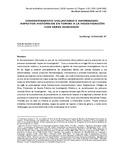Consentimiento voluntario e informado: aspectos históricos en torno a la investigación con seres humanos
Fecha
2013-09-25Autor
Palabras Clave
Historia, Consentimiento informado, Voluntad, Sujeto de investigación, Experimentos permisibles, Riesgo‐beneficioHistory, Informed consent, Will, Subject research, Experiments permissible, Risk‐benefit
Metadatos
Mostrar el registro completo del ítemResumen
El Consentimiento Informado es uno de los instrumentos ético‐jurídicos para la protección de la persona considerada “sujeto de investigación”. Tuvo su desarrollo en el siglo XX con el avance del conocimiento médico y la postura paternalista y egoísta de inescrupulosos investigadores con el fin de llegar a conocer principalmente las situaciones límites del cuerpo humano y sus enfermedades, nuevos productos farmacológicos, instrumentos y prótesis biomédicas, vacunas, terapias quirúrgicas y otros tratamientos. Éste siglo, con toda la historia previa, puede decirse que es uno de los momentos de mayor progreso científico y paradójicamente, dónde se cometieron las mayores atrocidades contra la persona y la humanidad. Independientemente de que a mediados de siglo se promulgaran varias Declaraciones trascendentales, Leyes, Reglamentos, Códigos de Ética, Protocolos de Buena Práctica de Investigación Médica y se constituyesen los primeros Comités Éticos de Investigación. Hoy, ya en la segunda década siglo XXI se continúa observando una serie de inconsistencias de pensamiento en materia de respeto a la dignidad y libertad de las personas en materia de investigaciones biomédicas. Pero como dice Marcelino Menéndez Pelayo: «Pueblo que no sabe su historia es pueblo condenado a irrevocable muerte. Puede producir brillantes individualidades aisladas, rasgos de pasión de ingenio y hasta de género, y serán como relámpagos que acrecentará más y más la lobreguez de la noche».
Información Adicional
| Otros Títulos | Voluntary and informed consent: historical aspects regarding the human research |
| Correo Electrónico | lschmidt01@gmail.com |
| ISSN | 2244-7482 |
| Resumen en otro Idioma | Informed Consent is one of the ethical and legal instruments for the protection of the person is a "Research Subject”. It had its development in the twentieth century with the advancement of medical knowledge and paternalistic posture selfish unscrupulous researchers to get to know mainly the extreme situations of the human body and its diseases, new drug products, instruments and biomedical prostheses, vaccines , surgical therapies and other treatments. This century, with all previous history, is arguably one of the greatest moments of scientific progress and paradoxically, where the worst atrocities were committed against the person and humanity. Whether at midcentury were enacted several momentous declarations, laws, regulations, codes of ethics, Best Practice Protocols for Medical Research and constituted the first Research Ethics Committees. Today, in the second decade of XXI century continues observing a number of inconsistencies of thought with regard to respect for the dignity and freedom of individuals in biomedical research. However, as Marceline Menendez Pelayo: «People who do not know their history are condemned people to death irrevocable. Can produce brilliant individual minds, traits of ingenuity and passion to gender, and will be like lightning that will increase more and more the gloom of night». |
| Colación | 1-52 |
| Periodicidad | semestral |
| Publicación Electrónica | Revista de Bioética Latinoamericana |
| Sección | Revista de Bioética Latinoamericana: Artículos |






